Pipelines into Biostatistics Visiting Faculty Workshop
July 18 – July 20, 2018
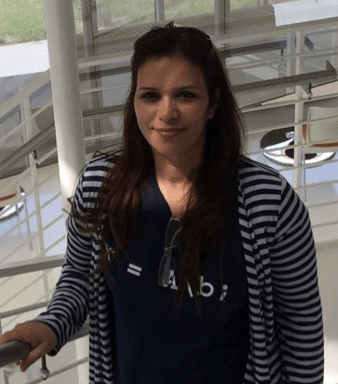
Fatima Boukari, PhD
Delaware State University
Fatima Boukari, PhD, recently joined the Department of Computer and Information Sciences at Delaware State University. She obtained her PhD degree in Applied Mathematics, working on the topic of image processing and analysis for the detection and tracking of biological objects. Her research interests have focused on combining mathematical and computer vision approaches to analyze diverse data (e.g. biomedical images, spectral data) in order to elucidate and quantify the structural and dynamical properties of biological and non-biological systems. She has been teaching theory of computing, algorithmics, discrete structures, graph theory, and compilers. She has mentored and comentored many students of diverse backgrounds. Her basic teaching goal is to show the glory of computer vision, machine learning, data mining and theory of computation by helping her students creatively explore real world problems amenable to solutions in these domains.
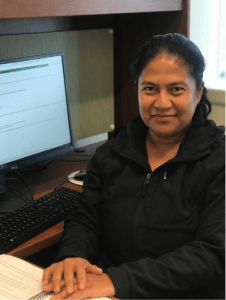 Maila Brucal-Hallare, PhD
Maila Brucal-Hallare, PhD
Norfolk State University
Maila Brucal-Hallare, PhD, has just completed her first-year as an Assistant Professor at the Mathematics Department of Norfolk State University (NSU), in Norfolk, VA. NSU is a small, historically black, liberal arts college in the southeast corner of Virginia called the Hampton Roads. One of her duties is teaching undergraduate courses in Mathematics (College Algebra, Elementary Statistics, Calculus I, Linear Algebra, Differential Equations, and Precalculus for Business Majors) and supervising undergraduate research in population dynamics. For her own research, she analyzed traveling waves over a lattice that is periodic and over a lattice that has an obstacle in the middle. However, by the end of the Fall semester, she was pulled into the direction of Mathematical Epidemiology where she is working with some colleagues on developing a mathematical model for the obesity epidemic. By the end of the Spring semester, she was tapped to help solidify the Mathematics behind some surveying projects in the NSU Department of Engineering. This summer, she is part of a small group consisting of Mathematicians, community college instructors, and high school mathematics teachers that is writing up a proposal for an NSF-sponsored grant called the Robert Noyce Teacher Scholarship Program that targets African-Americans in the Hampton Roads area who are interested in teaching Mathematics at the high school level. When the fall semester starts, she will be part of a committee in her department that will design a Master’s degree program in Applied Mathematics. She is very grateful that her training in pure Mathematics, the collegial work environment in the NSU Mathematics Department, and her supportive family make possible all of these university responsibilities.
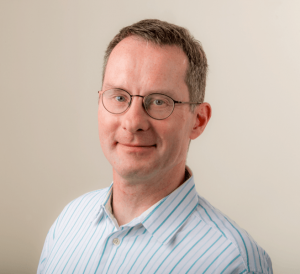 Christoph Schorl, PhD
Christoph Schorl, PhD
Brown University
Christoph Schorl, PhD, is an assistant professor (research) in Molecular Biology and Cell Biology, and the Director of the Genomics Core Facility at Brown University in Providence, RI. Christoph joined Brown University for postdoctoral training in late 2000, after completing his PhD in Molecular and Cellular Pathology at Dundee University in Scotland. Christoph received his undergraduate degree in Biology from Ruhr-University Bochum, Germany. Since 2007 Christoph has been responsible for the Genomics Core Facility, which has become an important part of the research infrastructure at Brown University. Christoph is responsible for all aspects of smooth operation of this widely used Core lab. The Genomics Core Facility provides instrument training, experimental design and data analysis, and fee for service genomic experiments to researchers ranging from undergraduate student to experienced scientist from the Brown community, affiliated hospitals, other local higher education institutions and biotech companies. Christoph very much cherishes the interaction with the Core Facility users, especially undergraduate students, and he has been an academic advisor at Brown for many years. In this capacity Christoph has worked with close to 100 students as a first and second year advisor, concentration advisor and faculty advising fellow. Christoph focuses in his advising on working with students from diverse backgrounds, from first generation students to national athletes to international students. In 2018 he was nominated by his students for and awarded the ‘Karen T. Romer Prize for Excellence in Undergraduate Advising and Mentoring’.
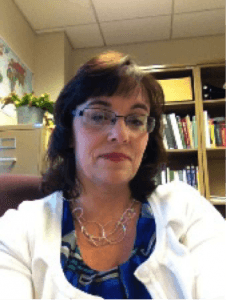 Lisa Smith
Lisa Smith
State University of New York at Geneseo
Lisa Smith has been a full-time lecturer in the Mathematics Department at the State University of New York at Geneseo for the last ten years. This past year she took on another role as the Director of the Math Learning Center, where the focus is to help students, and especially URMs whose deficits in secondary education preparation make the math/bio combination extremely difficult to master. SUNY Geneseo is a relatively small Liberal Arts college where a large number of students go on to graduate school. She teaches a wide range of courses, but her primary research area is Probability and Statistics. Teaching Calculus courses as well as senior level Probability and Statistics courses has allowed her to interact with students who also major or minor in Biology in a meaningful way. She has offered directed studies and a course in Stochastic modeling, and in the fall will be offering a course on Bayesian Analysis. Several of her students pursue advanced degrees in Bio-Math.
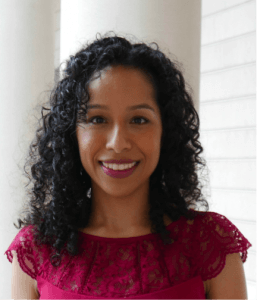 Patricia Vela, PhD
Patricia Vela, PhD
Agnes Scott College
Patricia Vela, PhD, is a Visiting Assistant Professor of Mathematics at Agnes Scott College. Agnes Scott is a liberal arts college, with a diverse student population, that empowers women to become leaders. Her research interests focus on investigating how technological artifacts, such as robots, can serve as thinking tools to make mathematics more accessible and enjoyable to students. Her research is motivated by her experiences as a mathematics student and her nine years teaching high school mathematics. Through her work, she hopes to find robotics-based tasks that strengthen students’ mathematical knowledge and their enjoyment of mathematics. Currently, she is teaching single variable calculus and finite mathematics. The majority of her students are first year college students.



